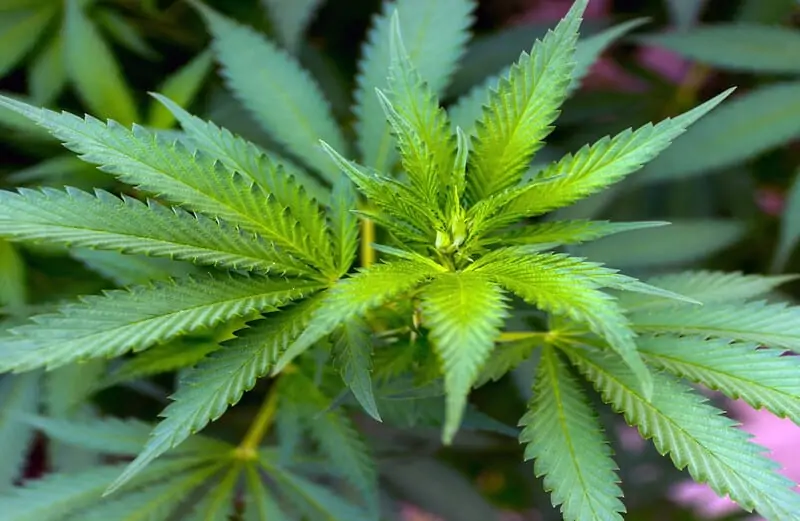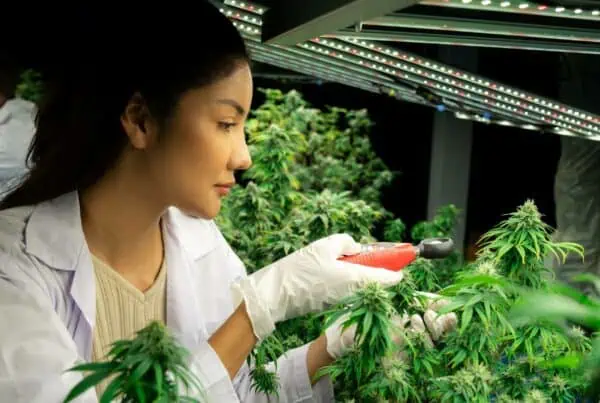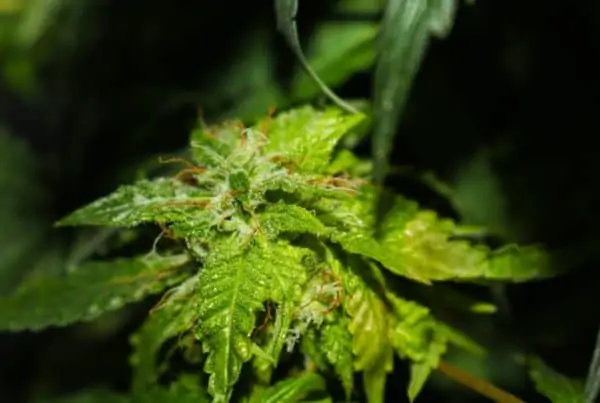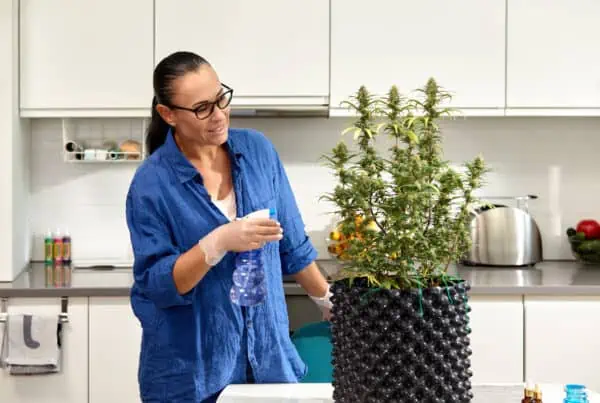TABLE OF CONTENTS
There are solutions to certain nutrient deficiencies in a marijuana plant.
Regular soil testing can help identify nutrient imbalances before they affect plant health. This allows you to adjust your nutrient application strategy proactively and maintain optimal soil health.
Calcium Deficiency
Calcium is an essential nutrient in cannabis plants that helps them grow plant tissues. It is a building block of the plant’s cell walls and membranes. Essentially, calcium is responsible for cell structure and protecting plants against pathogens.
How can you tell if your plant is suffering from a calcium deficiency? Here are a few signs to look out for on your cannabis plants. Keep in mind that these symptoms may also appear for other nutrient deficiencies.
- Curled leaf tips – In the absence of sufficient calcium, leaves can begin to curl. When you notice “parachute leaves,” you may have this nutrient deficiency.
- Discolored leaves – Brown or yellow chlorotic spots on the edges or throughout the leaves can likely indicate a calcium deficiency. This may also be a sign of other disorders, so it is crucial to perform a soil test to determine the missing nutrients.
- Rot – Rot development across new leaves and buds can be a sign of calcium deficiency and root rot. If you spot signs of decay, act fast to prevent necrosis. Necrotic leaves have dark veins.
- Delayed growth – Calcium-deficient cannabis plants tend to grow slowly. If your plants are taking a long time to reach maturity, test the soil to see if it is lacking calcium.
Calcium deficiency can be caused by various issues, including the following:
- Filtered or reverse osmosis water from the tap may be missing the proper level of calcium.
- Acidic growing mediums (below 6.2) can cause calcium to get locked out, even if you provide enough nutrients.
- Growing in hydro or coco-based gardens without calcium supplements can lead to a deficiency.
- Excess potassium can also be a reason for calcium deficiency.
How to Fix Calcium Deficiency
If your cannabis plant is suffering from calcium deficiency, here are a few methods you can try to bring it back to optimal health.
Calcium and magnesium deficiencies often show up together in cannabis plants. Because of this, many growers use a Calcium-Magnesium (Cal-Mag) supplement to fix the deficiencies. Growers can choose from liquid, powdered, and organic Cal-Mag supplements. You can see results in under a week.
Calcium deficiency can be corrected with dolomite lime, which has a neutral pH that can fix your soil’s pH. If growing indoors, mix about six teaspoons of dolomite lime for every gallon of soil and then sparsely water with water that has a 6.5 pH. Once wet, mix the soil thoroughly and wait a couple of days before testing the pH. You will need to do this for a few months.
Calcium deficiency may appear if the roots’ pH is too low. Soil-based gardens should have a pH of 6.2-7.0 to properly absorb calcium. Coco or hydro-based gardens should have a pH of 6.2-6.5 to absorb calcium. Many growers choose to flush their crops with neutral pH water to correct a calcium deficiency.
Magnesium Deficiency
Not having enough magnesium (Mg) in a garden commonly occurs in all types of planting mediums and hydroponic systems. The symptoms begin in the lower leaves, where they will start to yellow and show signs of chlorosis, which is a lack of chlorophyll in the leaves.
After this the leaves will curl inward and shortly after will die. Next, it moves upward to the middle and upper section of the leaves. Stems and petioles on the plant will turn purple. Magnesium is important for developing healthy veins and growing strong and healthy leaves.
How To Control Magnesium Deficiencies
- Use magnesium sulfate and Epsom salts. Use a teaspoon of Epsom salts per every 1-gallon of water.
- Try adding worm castings to the soil
- Add dolomite lime to the medium
Nitrogen Deficiency
A lack of nitrogen is the most common nutrient deficiency found in cannabis gardens. It can first be seen when the lower leaves turn a pale green color. Soon after, the leaves will become yellow and begin to die. Plants with not enough Nitrogen often have small leaves and do not grow properly.
The stems usually turn to a purple or red color. Nitrogen is important for the process of photosynthesis and the production of amino acids and chlorophyll. Nitrogen helps keep the leaves green. The leaves that receive the greatest amount of light are the youngest or newest leaves.
If new leaves aren't receiving adequate nitrogen, the plant will start to “steal” nitrogen from the older, bottom leaves, so that it can give it to newer leaves above. This is what causes the yellowing and wilting of a nitrogen deficiency and it is always seen first on the bottom, older leaves.
Plants will die quickly if nitrogen is not sufficient. Nitrogen is most important to the plants in the vegetative phase when they are growing fast.
During flowering, nitrogen levels can be decreased, but not entirely eliminated. Plants often show a nitrogen deficiency during the middle to the end of the flowering phase. This is normal. The plants become nitrogen deficient while they are focusing on the production of flowers.
It is actually a good sign if plants show signs of nitrogen deficiency right before harvesting. If you look at pictures of big buds right before harvest, almost always the leaves show yellowing. This is because Nitrogen levels drop during this time.
Do not make the mistake of adding more nitrogen right before harvest. Having an excess of nitrogen can decrease the size of the buds and have a negative impact on the smell and taste of the plant. If you notice this during the vegetative phase however, then it is a problem that needs addressing.
Keep in mind that it is normal for plants to lose a few leaves to yellow color that drop off and die. But if you see a whole bunch of them doing it during the vegetative phase than it is something that needs to be fixed.
How To Control Nitrogen Deficiencies
- Use a fertilizer that has a high level of Nitrogen (N-P-K)
- Add Bat Guano to the plants
- Add Fish Meal
Iron Deficiency
Iron deficiencies sometimes happen in hydroponic systems, outdoor cannabis gardens, and in indoor planting mediums. These deficiencies cause new leaves to turn bright yellow due to a lack of chlorophyll.
Iron deficiencies can be seen on all new growth except for the lower leaves of the plant. Iron is important, particularly for younger tissues in the cannabis plant. Enzymes need iron to function properly, and iron is important for the synthesis of chlorophyll.
How To Control Iron Deficiencies
- Use a foliar feeding option with a chelated iron fertilizer that also contains zinc and manganese.
- Flush the system with clean, proper pH level water.
- Add a supplement that contains Iron, Calcium and Magnesium.
Zinc Deficiency

Zinc is an essential micro-nutrient that plays a significant role in the overall health of marijuana plants. Like other plants, cannabis requires a balance of nutrients for optimal growth and yield.
While zinc is required in trace amounts, a deficiency can lead to serious growth issues.
Begin by checking the pH levels in your soil or growing medium. Adjusting the pH to an optimal level can enhance nutrient availability and may solve the issue without needing additional intervention.
If adjusting the pH doesn't solve the issue, consider using a zinc supplement. Many commercial micronutrient fertilizers or ‘cannabis nutrient mixes' contain zinc along with other micronutrients.
In case of chronic zinc deficiency, you may need to improve the soil quality. Using compost or organic matter can help enhance the soil's nutrient content.
Maintain a balanced nutrient ratio to prevent nutrient lockouts. Over-fertilization, particularly with phosphorus-rich fertilizers, should be avoided.
Phosphorous Deficiency
There are many factors that can lead to phosphorous deficiency in your cannabis plant:
- Over watering the cannabis plant.
- A high PH level of above 7 and also low PH levels.
- Using excessive phosphorous.
Your cannabis plant may be showing signs of phosphorous deficiency because the pH at the plant’s root is in the wrong range. This means that your cannabis plant won't be able to take in phosphorous through its roots because the pH isn't in the correct range. Therefore for optimum growth of your cannabis plant the first essential step is ensuring the pH is the recommended one.
Cannabis properly absorbs phosphorous in soil with the root pH of 6.2-7.0. Then cannabis takes in phosphorus well in hydro at a pH of 5.5-6.2. The most essential thing is to also ensure that the pH is not too high or low.
A temperature below 60 degrees and frequent changes in the temperature makes it hard for the cannabis plant to be able to use phosphorous well. Cannabis plants thrive well in a comfortable and cool environment and if the temperatures are very low then the cannabis plant is likely to develop phosphorous deficiency systems.
A simple thing like proper watering of cannabis can ensure that you prevent phosphorous deficiency. The major mistake that most growers make is overwatering the plant.
Best Nutrient Deficiency Solutions For Marijuana Plants
1. Alfalfa and Cottonseed Meal
If you are a marijuana grower and you notice any deficiency in nitrogen inside your cannabis garden, it is time to use alfalfa and cottonwood meal on the soil. The soil will get enough protein to handle the deficiency. Alfalfa is a fertilizer used to get more organic matter inside the soil. It simulates growth as well. Cottonseed meal has a lot of nitrogen and will also provide the solution for nitrogen deficiency.
2. Calcium Nitrate
If your marijuana plant experiences any deficiency in calcium, it is important to use calcium nitrate. You will find calcium nitrate in any local garden center.
It comes as a fertilizer and has about 15 percent of nitrogen. It will increase the pH level in your soil. Be careful when using it during the flowering stage or your marijuana plant could get damaged.
3. Compost Tea
You can amend your soil using compost tea. This is a preventative method of preparing your soil, especially for outdoor marijuana growing. Compost is rich in micronutrients and microbes. It strengthens the immune system of your marijuana plant or crop. It makes the soil much healthier for growth.
You cannot add compost to a hydroponic system, though. However, compost tea can add a lot of benefit to a hydroponic setting. You have to take extra care when doing so. You can buy compost tea at any hydroponic retail shop. However, you can buy it fresh or pre-prepared or you can make it yourself.
4. Fish Emulsion
Fish meal is the inedible parts that come from the fish. It comes in powdery form. Fish emulsion comes in liquid form after it is pressed to get the oil. Both are quite effective to be used on the marijuana plant. They help to correct the nitrogen deficiency.
“
There are over 300,000 jobs in the cannabis industry. CTU trained me for one of them!

Makes $24.50 @ THC +
5. Granite Dust
If your marijuana plant needs more potassium, try granite dust. It will slowly release into the soil and also provide other micronutrients, subsequently stabilizing the levels of alkaline in the soil.
For the most effective results, combine the granite dust with half compost mixture. You would put this into the soil as you are getting your marijuana bed ready. When you add the mixture to the soil, it is stimulated to grow organically.
6. Greensand
Greensand is made from crumbling sandstone and it has a lot of iron and potassium. It is green in color and rich in marine fossils and clay minerals. When applied to your marijuana plant, it slowly releases into the soil and provides a lot of benefit to the plant during its flowering stage, especially when you combine it with compost.
7. Guano
Guano is a fertilizer with a high level of nitrogen, earth salts and phosphorous. It is made from seabird or bat urine and feces. The guano that comes from the seabird is more beneficial in comparison to the bat guano. Pay attention to the label for too high a level of nutrient concentration.
8. Gypsum
Gypsum is a natural mineral that will help your marijuana plant to correct its level of sodium. When gypsum is added to the soil, it lowers the aluminum toxicity and increases sulfur and calcium. It is an excellent fertilizer that repairs and breaks up soil crusting.
9. Marijuana Booster
A marijuana plant does well when a booster is added. It grows bigger marijuana buds and keeps a balanced level of THC. The booster is filled with the right amount of nutrients your marijuana plant wants. Learn more about the marijuana plant at the Cannabis Training University.

Luis Cordova
Luis Cordova is a distinguished author, and renowned expert in cannabis cultivation, who possesses a Master's degree in Plant Biotechnology and Pharmaceutical Science. As a valued contributor to highly esteemed publications such as Cannabis Training University and Maximum Yield Magazine, Luis has emerged as a trusted source of guidance and knowledge in the cannabis industry. Having written thousands of informative articles, Luis is widely recognized for his comprehensive expertise on cultivating cannabis, both indoors and outdoors.












 Jeff was involved in an accident where he endured a traumatic brain injury. He had a week-long stay in ICU where brain surgeons
Jeff was involved in an accident where he endured a traumatic brain injury. He had a week-long stay in ICU where brain surgeons  100% risk free money back guarantee within 48 hours after purchase if student has not completed any of the courses or exams.
100% risk free money back guarantee within 48 hours after purchase if student has not completed any of the courses or exams.